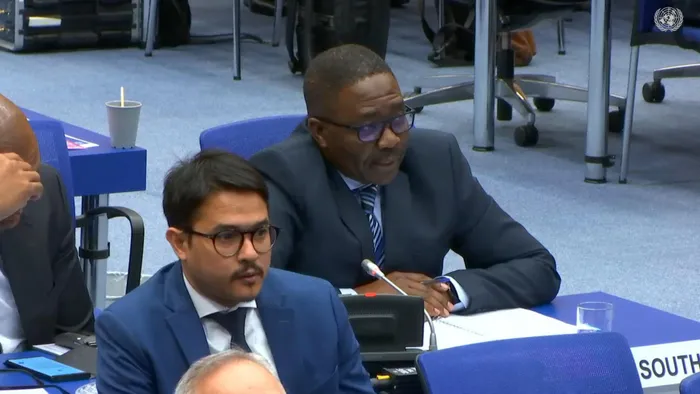South Africa ramps up efforts to combat environmental and organised crime

SAPS social crime prevention head Major-General Thokozani Mathonsi (back) shared how South Africa is tackling the rising threat of environmental crime through enhanced law enforcement, international cooperation, and innovative strategies at the UN Commission on Crime Prevention.
Image: Screenshot
Environmental crimes severely endanger South Africa’s ecosystems, economy, and communities. To address this increasing threat, strategies focusing on stronger law enforcement and increased global collaboration have been adopted.
At the 34th session of the United Nations Commission on Crime Prevention and Criminal Justice (CCPCJ) in Vienna, SAPS social crime prevention head Major-General Thokozani Mathonsi shared the country’s experiences with addressing new, emerging and evolving forms of crime, including crimes that affect the environment, smuggling of commercial goods and trafficking in cultural property, and other crimes targeting cultural property.
Mathonsi said wildlife poaching and trafficking, marine and coastal offences, destruction of protected areas, and illegal mining of precious metals have major negative impacts across ecological, economic, social, and security sectors. Effective law enforcement against these crimes requires adequate resources and enhanced collaboration to improve detection and prosecution.
“To address this challenge, South Africa established the Environmental Enforcement Fusion Centre (EEFC), which analyses data sets and provides critical evidence, including information retrieved from seized electronic devices. The National Integrated Strategy to Combat Wildlife Trafficking (NISCWT) enhances law enforcement and prosecution collaboration,” Mathonsi said.
He said that for South Africa, crimes affecting the environment constitute serious criminal offences and require cooperation among all Member States.
In this context, South Africa looks forward to the intergovernmental expert group (IEG) on crimes that affect the environment to identify gaps in the current international legal framework and explore the merits of developing an additional protocol to the United Nations Convention against Transnational Organised Crime (UNTOC).
Mathonsi said South Africa is experiencing a significant increase in counterfeit goods, including clothing, liquor, cigarettes, and medicines. This poses a threat to the sustainability of the country’s industries.
“To combat this crime, smuggled goods and misdeclared goods should be forfeited and destroyed,” he said.
South Africa continues to struggle with cross-border organised fraud, compounded by the emergence of new technologies, making organised fraud detection difficult.
“To combat these crimes, we have adopted a legislative framework to ensure that mechanisms for the seizure and confiscation of assets related to organised fraud are effectively implemented. The police can apply for property preservation orders and asset forfeiture orders,” Mathonsi said.
He stated that South Africa’s enhanced collaboration between governments and financial institutions at bilateral and regional levels has improved the identification and disruption of organised fraudulent financial transactions through strengthened information sharing.
He said a growing threat to criminal justice was the evolution of cybercrime, including artificial intelligence. Addressing this threat demands advanced resources and digital tools frequently lacking in developing nations.
“Member States should strengthen international cooperation by harmonising and aligning their national cybercrime legal frameworks to effectively counter cybercrime. The adoption of the first UN-based legally binding instrument on countering cybercrime would greatly enhance the fight against transnational organised crime and advance international cooperation in eliminating this growing threat.”
He reported a rise in extortion-related crimes, like the construction mafia in South Africa.
“Law enforcement agencies have deployed additional capacity to clamp down on extortionists and gangs and established a multi-disciplinary team to investigate and arrest those behind incidents of gang violence and extortion.”
Mathonsi added that to effectively combat crime, the police, community, and business sector must collaborate, recognising that it is a shared responsibility.
An Interpol representative said the organisation developed a range of capabilities to combat environmental crimes:
- Interpol deploys global operations to address the transnational nature of crimes that affect the environment.
- Interpol-supported investigations help countries address the problem of illegal waste export and pollution crime.
- Interpol’s secure I-24/7 communication system is being upgraded to Nexus for faster, structured global information exchange among law enforcement. It will enhance operational cooperation and handling of urgent requests related to financial crime, corruption, and environmental offences.
thobeka.ngema@inl.co.za